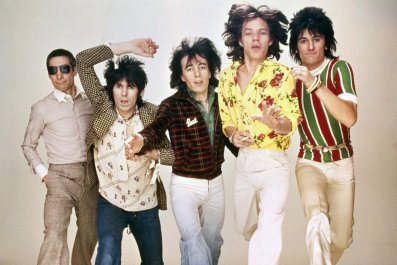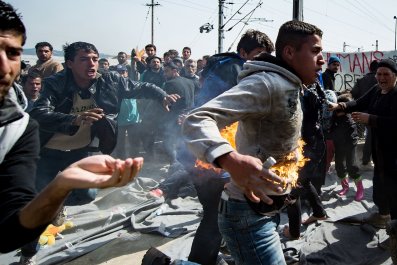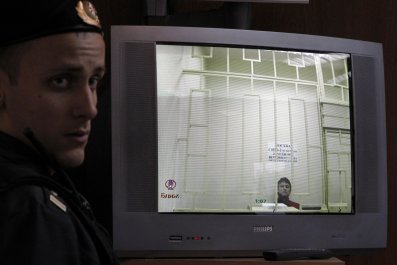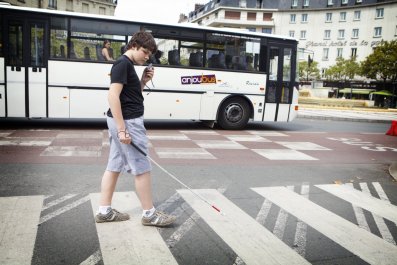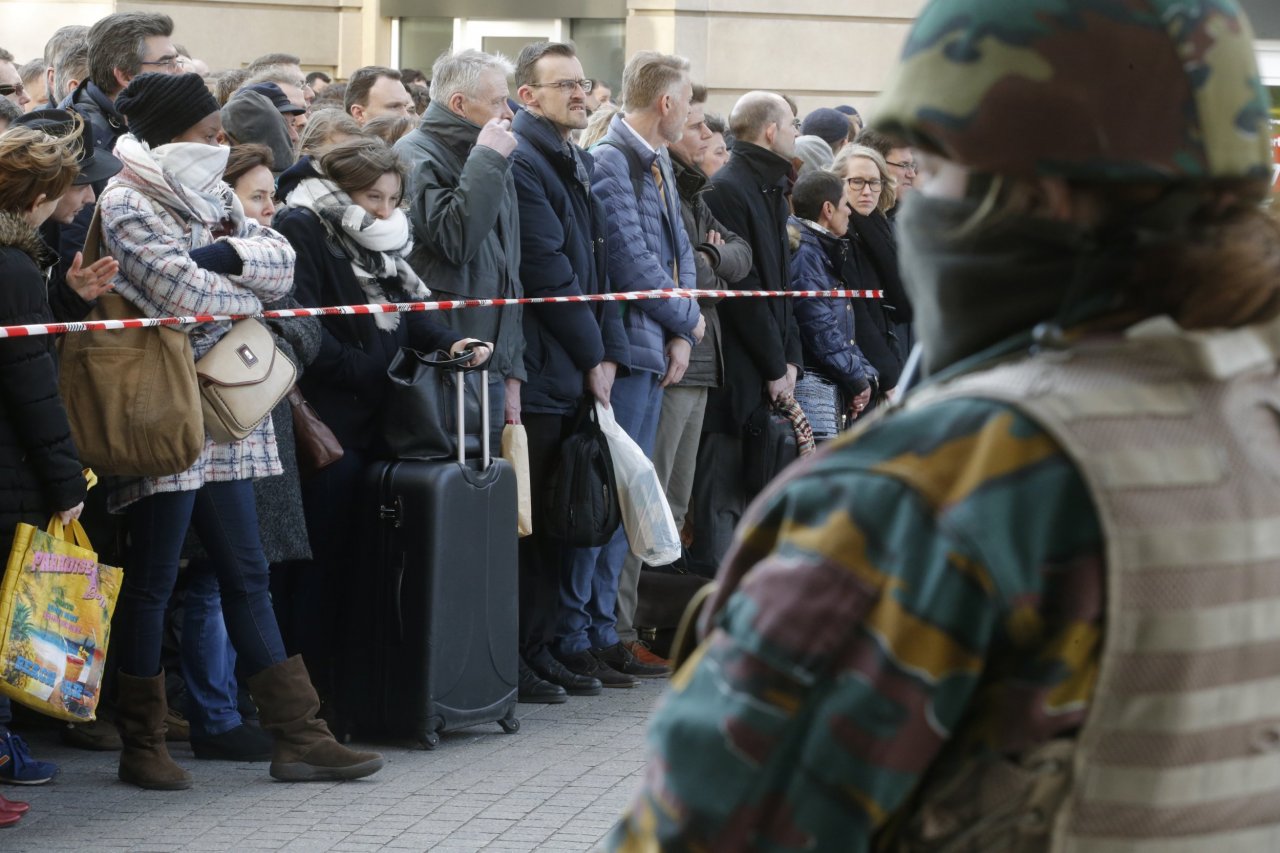
Anyone surprised by the murderous attack in Brussels has not been paying attention. On a per capita basis, Belgium has been Europe's hotbed of young Muslims who travel to Syria to fight alongside the Islamic State militant group (ISIS) and then return home, often ready to kill. But the world should hesitate before crediting this attack to ISIS, because doing so tends to infuse the group with power that it does not have.
These European attackers are not like the Al-Qaeda members of old—the radicalized adherents to fundamentalist Islam. Many of these new age killers were small children when the World Trade Center fell in 2001 and have spent much of their lives watching major wars in Afghanistan, Iraq and now Syria. Their knowledge of Islam is quite limited; they are more like jihadi hipsters than dedicated Islamists, or what some experts in the intelligence community call "jihadist cool." They celebrate what the Dutch coordinator for security and counterterrorism called "pop-jihad as a lifestyle."
These are youths who gather in groups, such as the recently dismantled Sharia4Belgium. They know less about Osama bin Laden than they do about Tupac Shakur; Belgians who travel to Syria to fight often revere the deceased American rapper on social media, identifying themselves with his lyrics about life in the inner cities. But these attackers also have their own rap music, hip clothes popular with young Muslims that are sold by companies like Urban Ummah and slogans akin to what might be found on a bumper sticker ("Work Hard, Pray Hard.") Their tweets often end with terms like #BeardLife and #HijabLife. While in Syria, they send selfies to their friends showing themselves wearing kohl, a traditional Middle Eastern eye shadow.
In other words, these are not intellectual Muslims with long beards and Korans in hand; labeling them jihadis or radical Islamists would be, to them, the highest compliment. In another time or another circumstance, these are young people who would be called losers or narcissistic punks—although they are punks who murder.
It's easy to confuse Belgium's new extremists with the ones from the previous decade. The murder of Ahmad Shah Massoud, the leader of the Northern Alliance who was killed just before the 9/11 attacks, was committed by men who plotted their attack in Brussels. A Belgian extremist cell that was part of the Groupe Islamique Marocain Combattant participated in the deadly Madrid train bombings in 2004. The next year, a Belgian named Muriel Degauque blew herself up in an attack in Iraq, making her the first known female suicide bomber from the West. But the old-line extremist networks have no connection to the "jihadist cool" aficionados.
These shallow Islamists have proved to be a challenge for European countries that use a traditional de-radicalization program for Muslims lured into the world of radical fundamentalists: It's hard to re-educate people about Islam when they knew almost nothing to begin with. In what may be the most representative event depicting the nature of these new Islamist extremists, two British Muslims, both 22, purchased copies of Islam for Dummies and The Koran for Dummies in August 2014 just before they boarded a plane on the first leg of their trip to join ISIS fighters in Syria.
The numbers of young European Muslims who have traveled to Syria to fight alongside ISIS is frightening. Recent intelligence estimates peg the number at more than 5,000, with about 470 coming from Belgium alone. While that is the largest number per capita of any country in the European Union, France is the leader in raw numbers, with 1,700 travelers to Syria.
What lures these youths into the brutal culture of radical Islam? The answer, according to intelligence officials, would be laughable if it was not so deadly: peer pressure and what might be called Rambo-envy.
"For foreign fighters the religious component in recruitment and radicalization is being replaced by more social elements such as peer pressure and role modelling,'' said a January 18 report by Europol, the European Union's law enforcement agency, which deals with militant networks. "Additionally the romantic prospect of being part of an important and exciting development, apart from more private considerations, may play a role."
Here is where things always get politicized. Trying to stop this conversion of young European Muslims into attackers requires understanding what underlies the change. Political blowhards, unable to tell the difference between hard-core Islamic radicals and practitioners of pop-jihad, rage that trying to figure out ways to intercede in that transformation amounts to excusing the attackers, an argument that plays well for the ignorant but that leaves intelligence officials rolling their eyes in frustration. Proclaiming "this was ISIS!"—when it was just punks inspired by the group—grafts the perception of worldwide power onto the organization, making it seem stronger than it actually is, which markets it as even more attractive to young Muslims seeking adventure and attention.
Let the blowhards blow. Here is what needs to be understood about the murderous practitioners of jihadi cool. Based on interviews with European Muslims returning from fighting in Syria, foreign intelligence agencies estimate that about 20 percent of them were diagnosed with mental illnesses before they left for the Middle East. A large percentage of them have prior records for both petty and serious crimes. And the vast majority of them come out of urban neighborhoods torn apart by economic hardship.
Rik Coolsaet, a professor of international relations at Ghent University in Belgium and a senior associate fellow at the Royal Institute of International Relations, recently wrote about the environment that has caused the development of this youth subculture in his country. Young Belgians, faced with a bleak job market, have higher suicide rates and more high school dropouts than most member states of the European Union.
"Youth representatives in Belgium recently warned that many young people are depressed and feel hopeless," Coolsaet wrote.
The result, intelligence analysts say, is those European Muslims that become fan-boys for ISIS are taking not a rational stand but an emotional one. "Areas where there are close-knit groups of susceptible youth, often lacking a sense of purpose or belonging outside their own circle, have proved to generate a momentum of recruitment that spreads through personal contacts from group to group," says a December 2015 report by the Soufan Group, a private intelligence analysis and security company.
In other words, attraction to the ISIS philosophy among European Muslins is like a virus, where proximity to the infected is the most common cause. And the locations where the beliefs are spreading can be just as easy to find as the sites where a disease emerges; in November 2015, Belgian Interior Minister Jan Jambon identified Molenbeek, a poor immigrant quarter of Brussels, as a hotbed for young Muslims traveling to Syria and back. So it should come as no surprise that the investigation into the Brussels attack immediately tracked suspects to Molenbeek.
And this is what's so frustrating about the new hipster pop-jihadism. Intelligence officials know most everything. Belgium publicly identified the location where potential attackers were most likely to be living. On January 25, Europol announced that the threat of an attack was at its highest level in a decade, warning that both France and Belgium were at the highest risk of an attack by those attacking soft targets in the heart of a large city. That is almost as specific as it gets.
Even with all that knowledge, however, disrupting an attack from this new breed of Islamic fans—rather than religious devotees—is enormously difficult. These are small cells of like-minded young people with operational autonomy, not some organization with top-down leadership like Al-Qaeda. Many of them do travel to Syria to learn tactics from ISIS before heading back home on their own. All it takes is some guns, some homemade bombs and some desire for fame to transform a loser into a hero among his friends and allies. And then the world eagerly attributes the attack to ISIS, which takes a bow for an attack its leaders probably knew nothing about and earns more cred that it uses to attract even more devotees.
So here the answer for solving the problem is quite different from the military strategy that was needed to deal with Al-Qaeda. Europe and America can't simply attack ISIS and expect the problem to be solved, not unless the Western nations want to start bombing themselves. This time, it is a law enforcement issue, one requiring sources, informants and sting operations, along with economic plans to create some hope for a future among Europe's youths.
Or the bombastic politicians and talking heads can continue perpetuating ignorance, banging the once-correct drum about a clash of civilizations; riling up the public about a vast, ISIS-controlled network; and ignoring the less-dramatic solutions that need to be pursued. The West is facing a threat from its own residents who want to be Rambo; it should resist the temptation to do the same.





